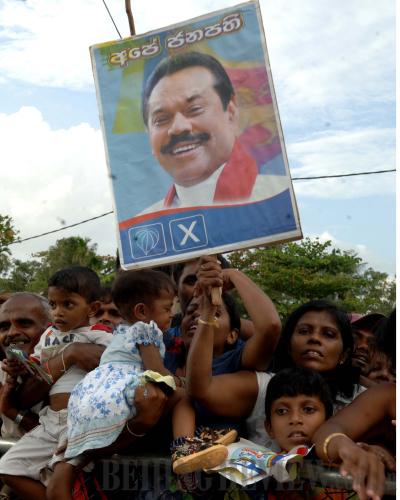|
To this end, he has to find solutions to national issues—particularly ethnic problems. During President Rajapaksa's first term, for example, he appointed an All-Party Representative Committee (APRC) as part of his efforts to address ethnic problems. The APRC consists of selected members from all the parties represented in the parliament. It convenes meetings to discuss how we can devolve power to help achieve the aspirations of the people. The president wants to continue discussions with all the political parties and representatives of all the ethnic groups in Sri Lanka to find ways of realizing national reconciliation and bring prosperity to the people—particularly those living in rural areas and in the war-affected areas in the north and the east.
 |
|
FOR THE PEOPLE: Sri Lankans celebrate the re-election of President Mahinda Rajapaksa in Colombo on January 27 (XINHUA) | So national reconciliation and economic prosperity are at the top of President Rajapaksa's agenda in his second term. The people will support him. We are going for the general election on April 8. We are expecting a large majority of the people to support the president's political party so that it will have strong parliamentary support in implementing the president's vision.
What's your view on the relationship between our two countries?
Sri Lanka is one of the first countries to recognize the People's Republic of China (PRC) after it was established in 1949. We recognized the PRC in January 1950 and, seven years later, the two countries established formal diplomatic relations. Since then, we have enjoyed strong political, economic and cultural relations.
Since President Rajapaksa came to power a few years ago, he has made special efforts to build a closer relationship with China's political leaders. I'm proud to say that within the last three years, the president has visited China no less than three times and had bilateral meetings with President Hu Jintao and his team on three occasions. Our Prime Minister Ratnasiri Wickramanayaka has visited China two times. All these are evidence that we have a concrete foundation for our political friendship.
Economically, we have also forged a strong partnership between our two countries. At the moment, bilateral trade totals $1.7 billion. Although the trade balance is in favor of China, we are not complaining because we can develop some other areas of our trade relations. For example, Chinese development assistance to Sri Lanka has increased considerably. In the last three years, China has provided Sri Lanka with about $3.5 billion worth of development assistance in the field of infrastructure development. We are building harbors, ports, airports and roads with China's support. China has also assisted Sri Lanka with the construction of public buildings. A lot of Chinese investment has flowed into Sri Lanka in recent years.
Culturally, we have frequent exchanges of artistic and religious groups. Tourism is one of the most promising areas we are working on. With peace in Sri Lanka, we had a 20-percent increase in Chinese travelers to Sri Lanka in the second half of last year. We are planning to introduce additional flights to Beijing and open Sri Lankan Airlines flights to Shanghai. With more flights, we are confident that we can attract a higher flow of tourist traffic to Sri Lanka.
Sri Lanka currently holds the chair of South Asian Association for Regional Cooperation (SAARC). What's your take on the prospects of South Asian cooperation within the SAARC framework?
SAARC brings brotherhood, friendship and partnership among South Asian nations. Some people have argued that SAARC has not developed as much as we expected. But if you look at other regional organizations such as the EU and ASEAN (Association of Southeast Asian Nations), you will come to realize that the development of regional organizations always takes a lot of time. It calls for efforts to build better understanding between neighbors—not only political understanding but also people-to-people exchanges. Strong economic relations between member countries are also essential. It is therefore a gradual process.
Sri Lanka has good relations with all the South Asian countries. At the SAARC summit last year, we discussed issues ranging from food security to antiterrorism. I believe SAARC has a bright future. And we are working to develop more consensus and closer relations in different fields so that SAARC will help create a more prosperous South Asia. | 